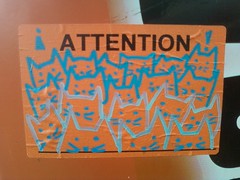Time
 |
| Photo by canardo via Flickr |
Attention
 |
| Photo by Lulu Hoeller via Flickr |
There are many prizes, competitions, and contests which reward focused attention on a difficult problem or idea:
- The Netflix Prize: a quest to improve the Netflix recommendation algorithm. Hundreds of teams worked for over two years for a $1 million dollar award which was presented in 2009.
- "Project 10 to the 100": a challenge sponsored by Google to come up with solutions to some of the world's most challenging problems (energy, education, housing, environment, health, etc). 16 ideas were chosen and the public voted for the top five ideas, each of which received $2 million to implement the idea.
- TED Prize: the core goal of TED is to award creative thinkers and innovators for their work in solving difficult problems or improving life around the world. Each winner is awarded $100,000 and allowed to make one wish, which the well-connected TED attendees excitedly make a reality.
The ability to stay focused and committed to finding a solution to a problem is one thing that separates the good from the great. When solutions are not obvious and require effort to discover, most give up.
Clear Thinking
The Shallows, by Nicholas Carr, is a book about how technology is changing the way that we think, and not for the better.
Having the discipline to turn off the flow of information and think clearly and deeply about the problem at hand in light of available information is the mark of a leader.
*********
I write these things because I struggle with them:
"When we go online, we enter an environment that promotes cursory reading, hurried and distracted thinking, and superficial learning...The Net's cacophony of stimuli short-circuits both conscious and unconscious thought, preventing our minds from thinking either deeply or creatively."Information is no longer a limiting resources. We all have access to far more information than we will ever need. It is very easy to continue the accumulation of information without ever acting on that information in a useful way. If unchecked, the accumulation of information can lead to confusion, information paralysis, and procrastination. No amount of information will lead us to make the perfect decision. Eventually, we must make a decision and move forward.
Having the discipline to turn off the flow of information and think clearly and deeply about the problem at hand in light of available information is the mark of a leader.
*********
I write these things because I struggle with them:
- I never have enough time in the day to act on the ideas that I generate.
- My mind races from task to task, idea to idea, like a crazed internet surfer clicking on hyperlinks.
- I am an information junky and have trouble turning off the tap.

The Nicholas Carr book looks fascinating. I think one of the challenges we face as educators relates to your statement about availability of information. If all the information is out there, then people have to develop the ability to critically evaluate the information. It's hard to get past the mindset of "If it's on the internet, it MUST be true." The question is, do the students have the patience (or can we help them develop the patience) to sort through something deeper than the shallows?
ReplyDelete